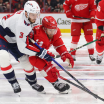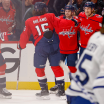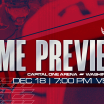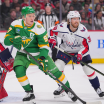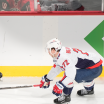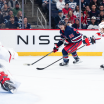Yvon Labre was one of 24 players chosen by the Capitals in the team's expansion draft. He was one of only two of those 24 players who remained on the Washington roster throughout the team's inaugural season. A stocky, hard-nosed defenseman from Northern Ontario, Labre was plucked from the Pittsburgh Penguins' system.
Caps Alumni Biographies: Yvon Labre
Yvon Labre was one of 24 players chosen by the Capitals in the team's expansion draft.
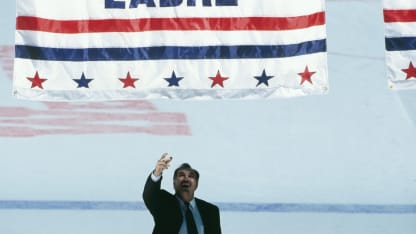
By
Washington Capitals
WashingtonCaps.com
There wasn't much for Washington hockey fans to cheer about in the early days of the franchise but the play and the presence of Labre on the Capitals blueline was a guiding and constant force throughout the dismal days of the 1970s.
The rugged Labre led the Capitals in PIM in each of the team's first two seasons; he also led Washington defensemen in scoring the maiden campaign of 1974-75. He tallied the Capitals' first-ever goal at the Capital Centre and served as the team's captain from Jan. 1976 through Nov. 1978. He was a regular on defense for three seasons before a series of injuries ravaged his career.
Labre was the last of the original Capitals to skate for Washington. The team retired his number on Nov. 7, 1981 and Labre remained with the team for most of the next two decades after his retirement. He served as an assistant coach, the team's TV color commentator and the club's director of community relations at various times throughout the 1980s and 1990s.
On June 12, 1974, the Washington Capitals conducted the expansion draft that would stock the franchise with its first core of players. Still some four months shy of their first regular season games, owner Abe Pollin's new hockey team selected a total of 24 players from the 16 existing NHL clubs. With their fourth selection (the eighth overall), the Capitals took a stocky, hard-nosed defenseman from the Pittsburgh Penguins organization. Yvon Labre, a 24-year-old native of northern Ontario, was a Washington Capital.
More than 25 years later, much has changed on the Washington hockey landscape. Pollin no longer owns the team, and the team no longer plays its games in its original Landover, Maryland home. Those 24 original Capitals are long gone from Washington; well, all but one of them. All but Labre.
Labre will turn 50 on November 29, 1999. He has now spent more than half his life drawing a paycheck from the Washington Capitals. But nothing lasts forever. Labre's long tenure with the team will come to an end next month; he is leaving the organization effective December 31. As the next century dawns, the last remaining link to the team's infancy will be gone.
When he left home at the age of 16 to start his hockey career, the kid from northern Ontario -- Sudbury to be exact -- had no idea he'd wind up spending a quarter-century in Washington. Labre left Sudbury to go to Markham, a Toronto suburb where he played for the Markham Waxers of the Toronto Metro Junior "B" League. The kid from Sudbury failed to light the red lamp in 32 games, but it didn't matter. Labre had established his career path as a rugged, no-nonsense defender who let opposing forwards know they weren't welcome in front of his net. For his efforts, Labre was named the league's outstanding defenseman.
He was then drafted to play for the fabled (Junior "A") Toronto Marlboros of the Ontario Hockey Association. But Labre did not make such an auspicious splash with the Marlies.
"[Former Maple Leaf] Gus Bodnar was our coach," Labre relates of his first season with the Marlboros. "All training camp, we had been practicing at George Bell Arena. And here we were coming into the season where we had our games and all our practices at Maple Leaf Gardens. I would come down to Maple Leaf Gardens from Markham in a car -- it was about 25, 30 miles -- and go right back afterwards. My first time practicing at the Gardens, I didn't have a very good day. I couldn't get myself to move. I couldn't move, period. My muscles had gone to concrete. Bodnar called me over. He said, 'What's wrong with you?' I said, 'I … I don't know coach. I really don't know.' He told me to get moving, but I couldn't get going. My muscles just wouldn't do anything. So he called me back over. He pointed up at the rafters and said, 'It's a pretty big building, isn't it?' All I could do was look way up in the end blues and the things that I'd watched on TV or listened to on the radio, and go, 'Yeah.' And he said, 'Look, you'll be all right, you farmer. You'll get over it. It's a big building and it must be intimidating you. Because right now, you're worse than a pee-wee player.'" Labre laughs at the recollection.
Labre soon got over the hurdle of playing at the Cathedral of Hockey on Church Street, but he also found himself pining for Sudbury."There was no doubt about it, I was homesick," he recalls. "I remember that first Christmas, I was so looking forward to going home. I didn't know if I was going to come back," he laughs.
"It's the first time that I was actually going to fly on a plane," Labre explains. "Frankie Hamill -- who was drafted by the Canadiens at the same time as me [Montreal's 10th pick, 79th overall] -- played [for the Marlboros] and also was from Sudbury. He'd been with the Marlies for three years. So he says, 'Follow me, rookie. Okay, our flight doesn't leave until this time at this gate, so let's go get something to eat. So we're eating, and while we're eating, there's an announcement we don't hear. We go to our gate at the time the plane is supposed to be leaving, and there is a plane leaving for the Bahamas or somewhere. So we asked where our flight was. And the airline guy says, 'Didn't you hear the announcement? It left from the gate. It's already gone.' Well, I couldn't believe it. I wanted to strangle [Hamill] because we only had a day or two to go up. So there we were at the Toronto airport on stand-by for a few hours, trying to go home. I was truly disappointed.
"But I did come back, and it was no problem after that. Once you make new friends in a place, it gets a lot easier. The homesickness went away."
In two seasons with the Marlies, Labre scored a total of five goals and 29 points. But he was rock solid in his own end, and he was a gritty competitor. The Pittsburgh Penguins took note of his strengths, and drafted him with the 38th overall pick in the 1969 Entry Draft. Labre began his pro career just up I-95, playing for the Baltimore Clippers, Pittsburgh's AHL affiliate.
The following season, the Penguins top minor league affiliate was the Amarillo (Texas) Wranglers of the Central Hockey League. Labre began the season in Amarillo, but was soon summoned to Pittsburgh.
Labre has no recollection of his first NHL game. But like most players, he vividly recalls his first NHL goal.
"The first goal, I remember. I beat Tony Esposito," Labre proudly recalls."It was in a game in Pittsburgh. I hit him right in the middle of the chest. You know how he went down on his knees? It caught him up high, and hit him at such an angle that the puck popped straight up, flipped end over end and fell straight behind him." Labre's eyes light up and he chuckles as he tells of beating a Hall of Fame netminder for the first of his 14 NHL career goals.
A taste of life with the Penguins whetted Labre's appetite for staying in the NHL. But so did his travel experience when the Penguins sent him back to Amarillo.
"When I first came up for those 21 games [in 1970-71], I stayed at the old William Penn hotel in Pittsburgh," Labre remembers. "I'd been there for more than a month, and they allowed me to bring my wife up. So both my wife and I were staying in the hotel. Then, when we went to fly back to Amarillo, that was a nightmare. We were supposed to fly to Chicago and then fly to Amarillo and that was it, we'd be home, right? Well, nobody accounted for the snowstorm. We couldn't land in Amarillo because of the 90-mile-an-hour crosswinds, so they flew us on to Albuquerque, New Mexico. There, I proceeded to grab a cab, go downtown to a bus station and buy two bus tickets to go on from there. Well, we got on the bus and we get into a place called Tucumcari, New Mexico. And they had blocked the road; the state police had blocked the road. They weren't letting any traffic go by. And so we spent the whole night on a bus -- a warm bus -- but the whole night on a bus station in Tucumcari, which is a one-horse town. We stayed there until the next morning when they opened up the road. I had very little money on me at that time, other than enough to pay for the cab and then the bus. Back then, I was 21 years old and I didn't have a danged credit card, eh? So I had to use all my cash, and when it came to morning time, I only had enough money to buy my wife and I a chocolate bar for breakfast."
Soon enough, Labre would be close to all the chocolate he wanted. Pittsburgh again shifted its top minor league club in 1971-72, this time to Hershey, Pennsylvania.
"I loved Hershey," he says. "Hershey was a great place to play. If you couldn't play in the majors, Hershey was a great place." Labre had three fine seasons in Hershey playing for a strong Bears team. Hershey won 33, 42 and 39 games in Labre's three seasons there. In 1973-74, Labre was an integral part of the Calder Cup-winning Hershey Bears squad. Sadly, it was the last taste of winning Labre would enjoy in his career.
His life changed in ways he could not yet imagine when the Capitals plucked him from the Penguins in the 1974 expansion draft. In a portend of seasons to come, Labre missed the Capitals first two games with a shoulder injury.
He first suited up for Washington's inaugural home game, the first ever at the Capital Centre. That night, October 15, 1974, Labre scored Washington's first-ever goal at home. Before only 8,093 spectators, he beat Kings goaltender Rogatien Vachon to give the Caps a 1-0 lead. The game ended in a 1-1 deadlock.
"I was happy," he says of being drafted by the Caps. "It was a chance to play regularly. But they were tough times. They were very tough. I always thought we could have won more games. But there is a snowball effect to winning and the same thing happens when you're losing. I always felt that the team itself could have played a lot better. But we didn't.
"I went into games looking to win, not to lose. When you lose that much, a lot of people lose interest. And that was the hardest thing to take; when you had teammates who lost interest, because that had an effect on everything else that happened. But it was a very good experience, it was great for me. That's evident by the fact that I'm still here. That's coming to an end, but that's okay. I'm still gonna be here. I'm planning on being here at games. I'm still going to do be supporting the team and doing some community involvement with the alumni."
That first Washington squad featured a pair of highly touted rookies, defenseman Greg Joly and winger Mike Marson. The two were force-fed at the NHL level when they would have been better off receiving their pro training at the minor league level. Each player had his own special burden to bear. Joly was the first overall pick in the 1974 Entry Draft and Marson was just the second African-American player ever to skate in the NHL.
"I think Joly had knee surgery that first year," Labre recalls. "That set him back. I don't know that the first year here ever did him any good. It was not good for young guys to be in that [losing] situation."
Labre was Marson's roommate on the road that season, and he witnessed first-hand the trials and tribulations endured by the teenage phenom.
"I remember they had cameras set up in hotel lobbies just interviewing him about [being the second African-American NHLer]," says Labre. "To me, he handled it pretty well. Mike was very mature for his age. I don't know if it affected his play or not. Mike could skate and handle himself with anybody in the league. I saw that when he took on the big defenseman from Chicago, Phil Russell. Phil Russell didn't want any more of Mike when he was finished. Mike's skills weren't honed very well as far as passing and receiving a pass. But he could skate with anybody and be physical with anybody. It's too bad they didn't get to develop more before they got to the National Hockey League because I think they both would have been much better hockey players."
Teammates dubbed Labre and Marson "Chico and the Man."
"[Former Capital] Blair Stewart is the only one who remembers that," laughs Labre. "Even now he still calls me Chico."
Marson, who grew up near Toronto, saw Labre play junior hockey for the Marlboros and went on to become his NHL teammate and roommate.
"Actually, he was one of my heroes when I used to go to the junior games. Yvon was consistent," Marson says of Labre. "He played tough, it didn't matter who it was or where it was, he played the same game. Even when he was hurt, he'd still get in there and do what he had to do."
Labre played 76 games for Washington that first year and appeared in all 80 games in 1975-76. He led the club in penalty minutes in each of those seasons and was named captain in the middle of the 1975-76 campaign.
A variety of injuries began to take a toll on Labre's body during the 1976-77 season. He played in 62 games that season, and was never able to play in as many games again over the remainder of his NHL career. Despite missing 18 games, Labre was named the team's outstanding defenseman in 1976-77. When he was able to drag his battered body to the ice, he was frequently at less than 100% physically. But his teammates and Capitals fans always knew that regardless of his physical condition, Labre was giving his every effort on the ice throughout every shift. Three times during his seven-year career in Washington, Labre was named the Capitals' Most Popular Player.
Memories? Labre has plenty. And some stand out above all.
"Probably the best road win I can remember for the franchise while I was playing was when we beat Philadelphia in Philadelphia," Labre affirms. "Six-nothing," he proudly blurts.
The date was December 21, 1980. The victory was made all the sweeter by the fact that the Flyers had defeated the Caps by a 5-2 count a night earlier at the Cap Centre.
"It was like, there was nothing they were going to be able to do about it. Archie Henderson [now the Capitals' pro scout] was brought up for that game. Archie Henderson took on [Flyers' tough-guy defenseman] Behn Wilson twice that night. He paid a price for it, because Behn Wilson was a good fighter. I know Archie took it on the chin for the team, but he was more than willing. And I remember our goaltender, Mike Palmateer, playing the game of his life. [Philadelphia outshot the Caps in that game, 44-29.] And it was like it didn't matter what they did, we were finally gonna kick their …" he trails off, satisfaction in his voice and on his face.
"I even scored a goal in that game," he proudly avers. "That was a big highlight for me. That after all those years of taking thumpings from the Broad Street bullies, that we went into their building and we thumped them." Besides scoring the penultimate goal of his NHL career, Labre also racked up 11 minutes of penalties in that contest, including five for fighting Philly's Mel Bridgman and a minor for roughing Flyers captain Bobby Clarke with less than five minutes remaining in the third.
But the old warrior had few games and but one goal left in his weary body. On February 12, 1981, Labre scored against Buffalo to give the Caps a 1-0 lead. Later in the game, he took a check from Buffalo rookie Steve Patrick. He felt something go in his knee right then. He suited up for the team's next game, against Montreal on February 14, but that was the last night any Capital player would wear number seven on the ice. With his knee in need of major reconstructive surgery, Labre surrendered to physical reality. The 31-year-old's playing career was over.
Nine months later, the Capitals hoisted his sweater to the rafters of the Capital Centre.
"There were a lot of good memories, but my best one has to be the retiring of my jersey by surprise. I had no idea it was being done when [former Caps radio broadcaster] Ron Weber had done 500 straight games of broadcasting. I was asked to be on the ice with him, and I said, 'Why? Why do I have to be out there with him?' I was told that Mr. Pollin wanted me out there, so I said, 'Okay, no problem.' I remember being out there, and the lights had all dimmed and the spotlight was on. It was supposed to be on Ron, who was already in his broadcast position. So the spotlight is on Ron, and I'm like, 'Great, let's get out of here.' But Ron pulls this jersey out that he'd been hiding in his jacket and he starts reading this spiel about me and retiring my jersey. I had no idea what to say at that time. It caught me totally off guard and by surprise. All I could manage, shaking in my boots, was, 'Thank you.' It was heartfelt, but that was all I could get out.
"Not in a million years would I have thought that could happen, yet it was happening to me. I don't fit into the category with Bobby Orr and Bobby Hull and Phil Esposito and those guys. No way. But here it was, happening to me. But I will always, always have a special place in my heart for the Washington Capitals and Abe Pollin."
The end of his playing career marked the beginning of many new careers for Labre with the Capitals. He served as an assistant coach, a broadcaster, a scout and as director of community relations. In 1995, he became director of special programs for both the Capitals and the NBA's Washington Wizards (nee Bullets). Throughout his post-playing career, he also served as a youth and adult hockey coach and was the area's unofficial ambassador for hockey. He has spread the gospel of hockey far and wide throughout the area over the last 25 years. Now, his days with the organization are nearing an end, and he can look back with pride on a multitude of accomplishments in so many aspects of the game. And the guy that brought him here in the first place is also proud of Labre.
Hockey Hall of Famer Milt Schmidt was the general manager who conducted that expansion draft in June of 1974. Schmidt, who won two Stanley Cups as a player and two as a general manager with the Boston Bruins, had a short tenure as the Capitals GM. But he brought Labre to the nation's capital, and he's glad he did.
"All I can say is that Yvon Labre is a wonderful guy," says the 81-year-old Schmidt, now living in retirement outside Boston. "When I had Yvon, there wasn't any doubt that he was giving me 125% percent regardless of what was happening; good, bad or otherwise. He's always been in the back of my mind, and the fact that he's still there with the Caps is great. They couldn't have picked a better guy for the good of the game and the good of the franchise."
Over the years, the Caps have had some great and not-so-great teams. But one constant has been woven into the fabric of the organization -- the Capitals have developed and maintained a reputation as a hard-working team that opponents dread facing. That holds true to this day, and Labre is the fiber of that fabric that stretches back to the very beginning of that proud tradition.
Labre is not sure what his future holds; he is mulling over a few possibilities for future employment. "It's time," he says, simply, of severing his ties with the organization. Labre still plans on continuing to play an active role in the team's alumni organization and will also continue in his role as the area's unofficial amateur hockey ambassador.He will also begin yet another career with the Capitals, this time as a fan. He'll still be in attendance at many Capitals home games. If you're lucky enough to be seated next to him, lend an ear and listen to the wealth of stories he can tell. And look up to the rafters and pay homage to the number seven sweater that hangs there. That's where it all began. Yvon Labre will be missed, but that sweater ensures that Yvon Labre will be remembered.
When Yvon Labre strapped on his hockey gear, he became a pure foot soldier who fought his battles in the toughest trenches of any arena in which he played.
He launched his advent to the big leagues with the Toronto Marlboros where he toiled as a slow-skating, defensive defenseman who played tough, engaged in scraps, and inspired his teammates with his big heart.
He made his NHL debut with the Pittsburgh Penguins in 1970 before being dispatched to the minors where he played in Baltimore, Amarillo, and Hershey. He won a return engagement with the Pens in 1973-74 and was then returned to the minors until the Washington Capitals selected him in the 1974 Expansion Draft.
His transition to the Caps marked his arrival as a full-fledged NHLer. The problem was, Labre was playing for one of the worst teams in league history?and he even had to struggle to make that team each year. He survived by throwing every ounce of his heart into clearing creases and engaging in fights that, more often than not, he lost because his arms were too short, as he once joked.
By 1980-81, Labre's knee gave out, forcing his early retirement. As a tribute to his career, he was invited out to centre ice where the Caps acknowledged his contribution to the club. In the process, he was stunned to learn that his #7 was to be retired to the rafters of the MCI Center.
Labre has since stayed on with the Caps' organization as a director of special programs.


